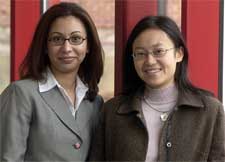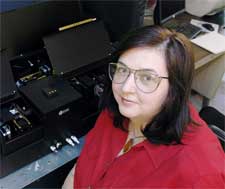 KINGSTON, R.I. — October 25, 2006 — Yana Reshetnyak, an assistant professor of physics at the University of Rhode Island, may have discovered a way to stop cancer cell growth without harming the healthy cells that surround them. Her novel approach could provide a new concept for drug delivery in the treatment of a variety of cancers.
KINGSTON, R.I. — October 25, 2006 — Yana Reshetnyak, an assistant professor of physics at the University of Rhode Island, may have discovered a way to stop cancer cell growth without harming the healthy cells that surround them. Her novel approach could provide a new concept for drug delivery in the treatment of a variety of cancers.
Reshetnyak was recruited to URI from Yale University as an ADVANCE Faculty Fellow, the centerpiece of the URI ADVANCE program, funded by a five-year $3.5 million National Science Foundation ADVANCE grant awarded in 2003. The grant is part of a nationwide effort to increase and retain the number of women faculty in the science, technology, engineering, and mathematics (STEM) fields.
“Women are severely under-represented in the hard sciences nationally,” said Lynn Pasquerella, vice provost of academic affairs, noting that women represent 25 percent of the science and engineering workforce and less than 21 percent of science and engineering faculty in four-year institutions. “Science and technology are the cornerstones of our society. Women bring different viewpoints, perspectives, skills, and values to the scientific table, which helps broaden and integrate scientific practices with society’s needs.
“Beyond equity for women in the workplace, women faculty are critically needed as role models for our female students,” continues Pasquerella, noting that 57 percent of this year’s incoming freshmen at URI are women.

The NSF grant has allowed URI to hire 10 women scientists and engineers such as Reshetnyak as ADVANCE Fellows one to three years before their actual tenure-track faculty openings occur. Since the grant pays the women’s salaries, the Fellows have been able to focus primarily on their research activities with significantly reduced teaching loads.
In addition to the Faculty Fellows program, ADVANCE has encouraged other departments to diversify their faculty through the regular hiring process. ADVANCE has offered assistance to search committees in how to conduct fair and unbiased searches, and has provided advocacy and guidance to women candidates who visit URI.
The ADVANCE program’s focus on recruiting women has largely accounted for the impressive increase in URI’s new STEM faculty hires who are female –from 26 percent during the 2000 to 2003 time period to 54 percent from the 2003 to 2006 time period. So far, 80 percent of the faculty hired in STEM fields this academic year have been women.
This fall, Reshetnyak, a biophysicist, and Yan Sun, an electrical engineer, were the first two Fellows to transition into tenured professorships. So in just three years, URI’s ADVANCE program, has reached its 5-year goal of providing funding for 10 Fellows, representing the fields of psychology (1), molecular biology (1), plant sciences (1), physics (1), electrical and civil engineering (2), and oceanography (4).
M. Beverly Swan, URI provost and vice president of academic affairs, has committed more than $2 million in University funds to support the ADVANCE Fellows and their transition into URI -funded tenure positions. Additional help came from David Farmer, dean of URI Graduate School of Oceanography. When the school was given funding for one Fellow, the dean was so enthusiastic about the program that he established four Fellows, using additional funding.
URI’s ADVANCE effort is not just recruiting top women scientists, but retaining them as well. Much of the effort, therefore, is to help the University create a friendly, inviting climate. All departments that received an ADVANCE Fellow, and several other departments, have participated in a workshop that helps create a collegial working atmosphere. In addition, the program–
• HOSTS CANDIDATE LUNCHEONS: ADVANCE takes most candidates to lunch to discuss networking, negotiating strategies, and other issues of concern.
• PROVIDES ENHANCED SUPPORT AND TRAINING: Career workshops and a topical lunch series are open to all women scientists and engineers.
• CREATES MENTORING PROGRAM: Mentoring is a key factor in career success. ADVANCE has matched junior STEM faculty with mentors and provided training. A formal mentoring program is being developed in collaboration with the College of Arts and Sciences and the College of the Environment and Life Sciences.
• INSTITUTIONALIZES INCENTIVE FUND: ADVANCE has annually offered an incentive fund that rewards research by women STEM faculty or endeavors that promote women in STEM fields. Provost Swan has institutionalized this initiative, as the URI Research Office has absorbed the funding as part of its annual award program.
• GAINS APPROVAL OF PAID FAMILY LEAVE: A paid family leave policy, a collaboration of the President’s Commission on the Status of Women, the ADVANCE Program, and the Women’s Equity Committee, was approved by the Rhode Island Board of Governors in January 2005. The policy expanded “maternity” leave to parental leave to include both males and females and urged sensitivity toward single-parent families and other family structures. The parental leave policy includes 6 weeks of paid leave, in addition to sick leave or unpaid leave options.
• DRAFTS DUAL CAREER POLICY: Dual careers create a challenge for universities everywhere, and creating an effective policy for accommodating the needs of accompanying partners is necessary to competitively recruit excellent faculty. Women scientists and engineers are likely to be partnered with another scientist. A policy is in its final phase.
• COLLECTS DATA: ADVANCE is preparing to distribute its second climate survey to faculty to assess the status of women and their working environment in the STEM departments. The program regularly collects data, benchmarking progress on its many initiatives.
URI’s ADVANCE program will now focus primarily on promoting family friendly polices. “The U.S. need to be responsive to the needs of our changing workforce,” says Barbara Silver, ADVANCE program director. “ If we’re going to be competitive, we have to be able to provide flexible options for an increasingly diverse pool of workers. For example, our program is promoting awareness that a wide variety of care giving needs today, including care of children, elderly, disabled, and ill family members, disproportionately affect women and can impede their careers. Consequently, our goal is to create flexible and responsive policies and practices, such as offering tenure-clock stoppage without negative repercussions and part-time employment options.”
One of the program’s current initiatives is to create a work life center, which examines such policies and practices and conducts work-life research. In addition to care giving needs, the center could examine issues such dual career families, modified duties, policies that extend beyond faculty to all staff and students, and changing the cultural norms about how the “ideal worker” is defined.
Currently there are 34 universities with ADVANCE programs–including Brown University, which was awarded an NSF grant this fall –implementing similar approaches to boost the numbers of women faculty to develop a more diverse science and engineering workforce.
“There is a potential to collaborate and network with Brown,” says Silver. “It would be great to join forces to spread the initiative statewide, into other state institutions of higher educations and even high schools and industry.”
Pictured above
ADVANCE Fellow Yana Reshetnyak, assistant professor of physics, of West Kingston.
URI News Bureau Photo by Michael Salerno Photography.
URI ADVANCE Fellows (l-r) Mayrai Gindy, assistant professor of civil engineering of North Kingstown and Yan Sun, assistant professor of electrical engineering of Wakefield. URI News Bureau Photo by Michael Salerno Photography.

